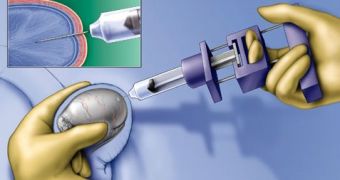What would women do without men in their lives? The vital role of the men in saving women is proven by a new research showing how a protein from testes protects women against a recurrence of ovarian cancer...
These are the results of an early stage clinical trial checking a therapeutic vaccine against the illness. This vaccine could boost the body's immune system, also fighting against the recurrence of ovarian tumors. The vaccine was based on fragments of a protein called NY-ESO-1. Both sexes carry the gene, but only the male organism synthesizes the protein. For unknown reasons, the gene gets activated in 40% of ovarian tumors.
A team led by Kunle Odunsi at the Roswell Park Cancer Institute in Buffalo, New York, US, recruited 18 subjects who had experienced multiple recurrences of NY-ESO-1-positive ovarian cancer for a phase I clinical trial to test this vaccine. At the beginning of the trial, none of the subjects had any ovarian tumors, but they had a high likelihood of redeveloping them. The vaccine was intended to delay a further return of the cancer in such patients by training the immune system to recognize and kill NY-ESO-1 positive cells.
The subjects received up to five injections of the protein for four months, and were monitored on average less than two years. 15 subjects (83%) displayed a positive immune reaction to the vaccine. Normally, ovarian cancer patients do not display detectable levels of "CD4" immune cells, specifically charged to attack NY-ESO-1-positive tissues. But in patients sensitive to the vaccine, about 1% of the CD4 cells turned reactive to the protein. "These women did not experience a recurrence of ovarian cancer for a year, on average," said Odunsi.
The 3 subjects whose immune system did not react experienced a cancer return in about six months. However, Odunsi admitted that a more ample research is required but he hopes that the phase II trial, already on course, will confirm the benefits brought about by the vaccine. "The phase II trial involves the use of the whole NY-ESO-1 protein, rather than only a fragment of it, and attaching it to a harmless virus - measures which should both induce an even larger immune response. In the phase I trials, there were pretty much no side effects besides pain and rash at the injection site" said Odunsi.
As the vaccine employs a human protein, there is a risk that it could trigger an autoimmune reaction, but Odunsi stated this possibility is "incredibly small". "It is a therapeutic vaccine to prevent relapse of ovarian cancer. One day, if it proves safe and effective, it could possibly be used as a prophylactic treatment for women who carry BRCA gene mutations and therefore face a high risk of developing ovarian tumors. One can envision that you could vaccinate as a preventative measure in this group of women," said Odunsi.
Still, not everybody is convinced about this idea. "We are far from developing an effective ovarian cancer vaccine. There are several investigators around the country who are working on this, but only a few vaccines have made it to clinical trials in patients." said Judith Wolf, chair of the US National Cancer Coalition's medical advisory board.
Other researches tried to use cells from the patients' own tumors to boost an immune response.
Annually, 25,000 women develop ovarian cancer in the US alone, and hormone replacement therapy aims to improve symptoms of menopause, which seems to be a high risk factor in developing cancer.

 14 DAY TRIAL //
14 DAY TRIAL //